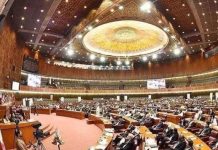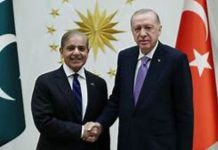ISLAMABAD : Foreign Minister Shah Mahmood Qureshi said Tuesday that the entire country was united on the issue of occupied Kashmir and will give ‘one message’ to India on the one-year anniversary of New Delhi’s August 5 move.
“There is no confusion in our emotions or direction,” said the foreign minister. The entire country is united [on Kashmir issue] and will send one message to India [on August 5],” he added.
The foreign minister said that he had invited all political parties and stakeholders, which included the PPP, PML-N and other parties’ leaderships, to the Foreign Office where they will exchange views on the Kashmir issue.
“We will take the political and Kashmiri leadership into confidence regarding the issue,” he stressed, adding that the Yaum-e-Istehsal event will also come under discussion during today’s cabinet session.
Answering a question about Pakistan’s response and what more needed to be done, the foreign minister said that the struggle to provide the right of self-determination to the people of Kashmir was an ongoing one.
“See, this is a struggle and it will have its ups and downs,” he said. “Our stance hasn’t changed and our destination is Srinagar. The locks and chains on the Jamia Masjid Srinagar will be broken,” he added.
FM Qureshi said that political activists, stakeholders and other members of the society will take part in Yaum-e-Istehsal rallies around the country tomorrow. “We will observe one-minute silence, of course, keeping in mind the SOPs due to the coronavirus pandemic,” he said.
The foreign minister lashed out at the Indian government for imposing a curfew in the occupied region, saying that it had negated India’s stance.
“India’s stance has been buried [by its decision to impose curfew again],” he said. “It shows that the Indian rulers aren’t confident that Kashmiris will agree with them, despite the government’s oppression and greed tactics,” he added.
India abolishes special status of occupied Kashmir
Last year on August 5, the Indian government rushed through a presidential decree to abolish Article 370 of the Constitution which granted special status to Indian occupied Kashmir, as tensions mounted in the disputed valley with unprecedented numbers of Indian troops deployed in the region.
Indian Home Minister Amit Shah had introduced a resolution to scrap Article 370 in Rajya Sabha, which revoked the special status granted to occupied Kashmir and made the state a Union Territory with the legislature.
The occupied valley has been bifurcated into two Union territories – Jammu and Kashmir, which will have a legislature, and Ladakh, which will be without a legislature, the home minister had said, amid uproar from the opposition in the Upper House.
What are Articles 370 and 35A?
Article 370 of the Indian Constitution is a ‘temporary provision’ which grants special autonomous status to occupied Kashmir. All the provisions of the Constitution which are applicable to other states are not applicable to occupied Kashmir.
According to this article, except for defence, foreign affairs, finance and communications, the Indian Parliament needs the state government’s concurrence for applying all other laws. The residents of occupied Kashmir, therefore, live under a separate set of laws as compared to Indian citizens elsewhere in the country, including those related to citizenship, ownership of property, and fundamental rights.
Article 35A which stems from Article 370 was introduced through a Presidential Order in 1954. This article empowers the legislature of occupied Kashmir to define the state’s permanent residents and their special rights and privileges.
Under Article 35A, Indian citizens from other states cannot purchase land or property in occupied Kashmir.

















